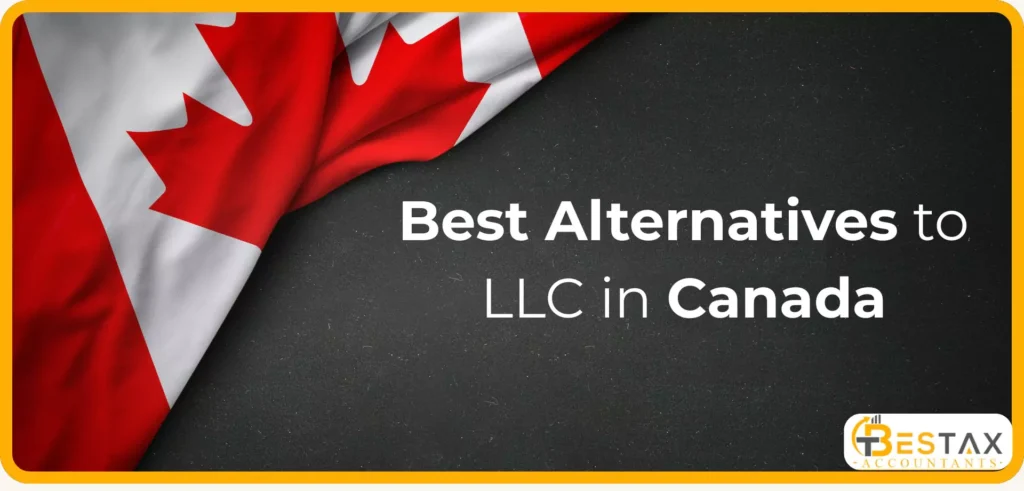Many people think about starting an LLC in Canada. But there’s something important to know. LLCs, or Limited Liability Companies, do not exist in Canada. The U.S. has LLCs, but Canada uses a different system.
The closest option to an LLC in Canada is a corporation. This is a separate legal structure. In some cases, a U.S.-based LLC can register and operate in Canada. But this needs to be done under provincial laws. It also comes with extra steps and rules.
So, if you’re planning to expand your business into Canada, you won’t find a direct LLC setup like in the U.S. Still, there are other ways to start your business rather than starting LLC in Canada.
What is an LLC in the U.S.?
In the United States, an LLC stands for Limited Liability Company. It protects the owner’s personal assets, just like a corporation. But the way it’s taxed is more flexible.
A U.S. LLC lets profits pass straight to the owner. That means there’s no separate business tax. The owner just pays personal tax. This helps avoid double taxation, once at the company level and again personally.
Corporations, on the other hand, are taxed separately. If the owner takes money out, the company must pay tax on profits. Then, the owner pays personal tax on the dividends. That’s two layers of tax.
So with an LLC in the U.S., you get the legal protection of a corporation, but with a simpler tax setup.
Now you might be wondering, if that’s how it works in the U.S., what can you do if you’re in Canada?
Let’s go through the best alternatives to an LLC in Canada, how to register, what the rules are, and how taxes work. This way, you can choose the option that fits your business best.

Best Alternatives to LLC in Canada
Even though Canada doesn’t offer LLCs, it still has to decide how to deal with a US LLC for tax purposes. Canada sees an LLC as a corporation, especially when it’s owned or controlled by Canadians. There are better, simpler choices right here in Canada:

Sole Proprietorship
Sole Proprietorship is the easiest way to start. No need to create a company, and you run your business independently. It works well if you’re just getting started, don’t need legal protection, and want to keep all your income.
You report the income on your tax return. You can use your own name or register a business name. If you use a business name, you’ll need a separate bank account. Just make sure your customers know who to pay.
But there’s one big risk. If anything goes wrong, your assets are not protected. That means your car, house, or savings could be at risk if the business runs into trouble.
Registering a Sole Proprietorship
There are a few things you might need to do to set up a sole proprietorship or a partnership. First, you may need to register your business with the province or territory where you plan to operate. Each region has its own rules, so it’s important to check what applies to you.
You might also need a federal business number. This number is used for things like taxes, payroll, and importing or exporting goods. You may also need to open different tax accounts based on what your business does.
Another important step is getting the right permits and licences. Some businesses need special approvals to operate legally. It’s a good idea to visit the website of your provincial or territorial business registrar.
Canadian Corporation
A Canadian Corporation is a more formal setup. The business becomes its own legal person. It can sign contracts and own property. You, as the owner, get personal protection, and your assets are separate from the company.
It also gives you a tax advantage if you don’t need all your income right away. You can leave money in the corporation and pay lower taxes on it until you take it out.
You’ll need to fill out articles of incorporation and send them to the right government office, either provincial, territorial, or federal. Once it’s set up, the corporation can keep going even if the owners change.
Registering a Corporation
Starting a corporation in Canada involves a few key steps.
First, you must incorporate your business by getting articles of incorporation. You can incorporate federally or through your province or territory.
Next, you’ll need a federal business number and a corporate income tax account from the Canada Revenue Agency.
If you plan to operate in other provinces or territories, you must register as an extra-provincial or extra-territorial corporation.
You’ll also need any permits and licences required for your type of business.
In some provinces, you can get your business number, tax accounts, and registrations all at once during incorporation. But this isn’t available everywhere, so check your local rules.
Doing Business in Canada with a U.S. LLC
If you have a U.S. Limited Liability Company (LLC) and want to do business in Canada, you can, but there are a few things to keep in mind. Canada doesn’t officially recognize LLCs the same way the U.S. does. So, when your LLC operates in Canada, the Canada Revenue Agency (CRA) treats it as a corporation for tax purposes.
This means your LLC will pay Canadian corporate taxes. The income isn’t taxed in your hands until it’s paid out to you. So even though it’s an LLC in the U.S., it works like a corporation in Canada.
If you’re a U.S. business owner looking to expand into Canada, you’ll need to register your business extra-provincially. That means you must register in each province where you plan to operate.
What Does Registering an LLC in Canada Involve?
Each province has its own rules. Even though your company is based in the U.S., you’ll need to follow the local process. Let’s go through how a U.S. LLC in Canada can register in a few provinces.
Alberta
In Alberta, your LLC must provide a legal opinion. This document needs to confirm that:
- The LLC is a legal body, not a partnership or informal group
- It’s a separate legal entity from its members
- Members aren’t personally responsible for the LLC’s debts, as long as they follow the law
- The LLC can sue and be sued in its name
- It can make contracts in its name
- It can own and sell property
Along with the legal opinion, your LLC must submit:
- A NUANS report (to check if your business name is available)
- A Statement of Registration
- An Appointment of Attorney for Service (like a registered agent)
- A certified copy of your formation documents
British Columbia
In B.C., your LLC registers just like a regular corporation. The Business Corporations Act includes rules for LLCs. It uses the word “director” to mean manager and “shareholder” to mean member.
To register your LLC in British Columbia, you’ll need to file:
- A Name Reservation form
- A Registration Statement
- A Request for a Business Number
- A Certificate of Good Standing from your home state
Read More: How to Register a Business in BC, Canada?
Manitoba
In Manitoba, LLCs also follow the same process as corporations. But there are a few extra steps. Your LLC must submit:
- A Name Reservation
- An Application for Registration
- A Power of Attorney
- Your formation documents (like your Articles of Organization)
- Any changes or amendments to those documents
Ontario
Ontario is a bit different. U.S. LLCs don’t register as corporations. Instead, they register under the Ontario Business Names Act. This process is simpler, but the rules are unique.
LLCs in Ontario:
- Do not need to appoint an attorney for service
- Can be served legal documents at their place of business, their U.S. formation address, or their head office
- Must file Form 6 under the Business Names Act
- Need to renew the registration every five years
- Do not need to submit extra documents
Read More: From Trade Name Registration to Business License in Ontario
Understanding these differences early can save you time and money. It also helps avoid delays during the registration process. Choosing the right province and structure will depend on where you do business and how you want to grow your company.
Final Thoughts
Choosing the right structure matters a lot when setting up a business in Canada. Whether it’s a sole proprietorship, a Canadian corporation, or registering your U.S. LLC for Canadian business, your setup can affect everything, from taxes to legal protection.
If all of this feels a bit overwhelming, you’re not alone. The good news is, you don’t have to figure it out on your own.
Bestax can help.
They’ll guide you through the process, help you choose the right structure for your business, and take care of setting up your company the right way.
Reach out today and get expert support for forming your company in Canada with confidence.
Quick FAQs
What is a Limited Liability Company (LLC)?
An LLC is a type of business structure used in the United States. It gives the owner personal protection from business debts, like a corporation does. However, it also allows profits to be taxed directly to the owner, like a partnership. This helps avoid double taxation.
Can you create an LLC in Canada?
Canada doesn’t have LLCs like the U.S. Instead, you can choose from other business types such as a corporation (Inc.), a sole proprietorship, or a limited liability partnership (LLP).
Can a Canadian citizen open an LLC?
A Canadian citizen can open an LLC, but only in the United States. You can register one in any U.S. state.
Can I open a U.S. LLC in Canada?
You can’t open a U.S. LLC in Canada, but you can register your U.S. LLC to operate in Canada. This is done through extra-provincial registration. The rules are different in each province, and you may need to submit legal documents and follow local requirements.
What are the tax benefits of a corporation in Canada?
A Canadian corporation can help you lower or delay taxes. You only pay personal tax when you take money out of the business. So if you don’t need all your income right away, you can leave some in the company and pay less tax now. Corporations also offer personal asset protection and more options for growth.
Disclaimer: The information provided in this blog is for general informational purposes only. For professional assistance and advice, please contact experts.




